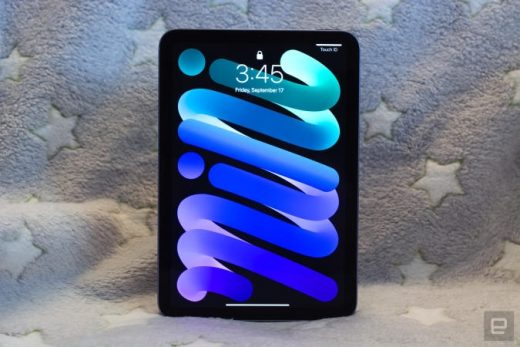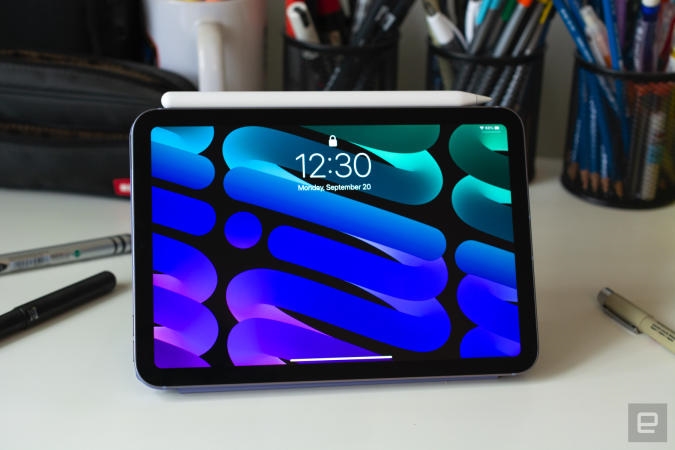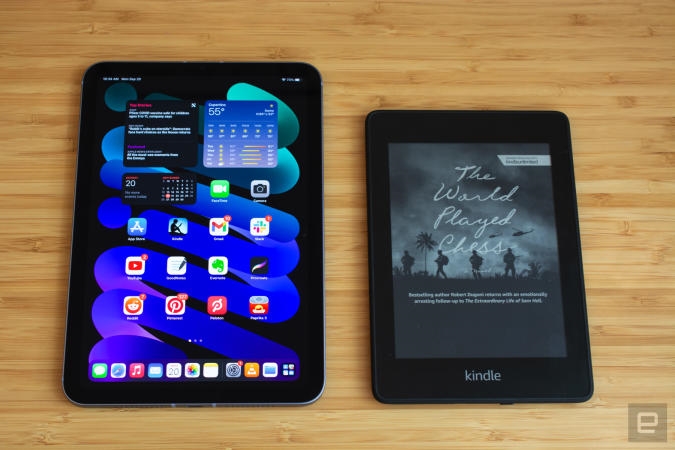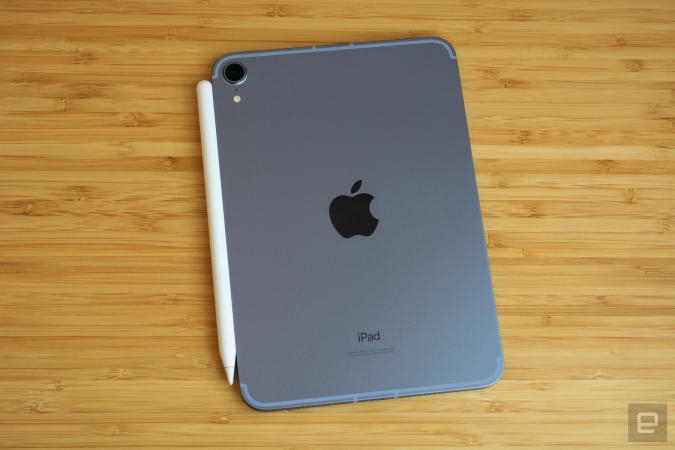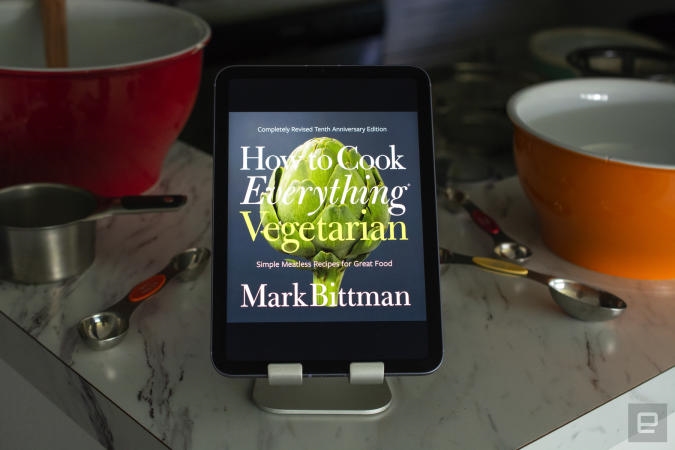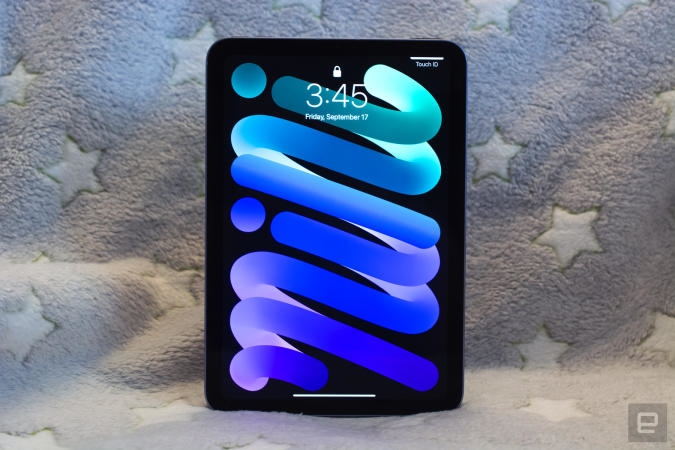Apple’s iPad mini is back on sale for $400 at Amazon
iPad mini review (2021): The best small tablet gets a facelift
It finally looks fresh, but the niche appeal remains the same.
It’s almost comical how stagnant the iPad mini has been in recent years. The 2019 version sported an upgraded processor and a slightly nicer display, but essentially looked the same as the tablet that debuted in 2012 (which is dated, to say the least). That hasn’t stopped the iPad mini from gaining a loyal following though, and we even called 2019’s mini our favorite small tablet.
Now it appears that Apple’s giving the tablet the love that its devotees have been asking for. The 6th-generation iPad mini is really more of an iPad-Air mini with its new “all-screen” Liquid Retina design, TouchID-capable top button, second-generation Apple Pencil support and USB-C charging. It’s the most significant update the mini has received in years, and Apple’s hoping you’ll pay extra for it. The 2021 iPad mini starts at $499, $100 more than its predecessor’s starting price, and with that Apple is squashing any notions that “smaller” means “lesser.”
Apple iPad mini (2021)
Pros
- Fresh and modern design
- Solid performance
- Improved cameras with Center Stage
- USB-C charging
- 5G support
- Works with second-gen Apple Pencil
Cons
- No headphone jack
- Base model has only 64GB of storage
- More expensive than previous model
Design and hardware
Many people, myself included, were happy to see the facelift Apple gave the iPad mini. While the old design with the physical Home button isn’t necessarily bad (it’s still good enough for the new 10.2-inch iPad, apparently), it felt boring on the mini after seeing it unchanged for so many years. This year’s iPad mini has what Apple calls an “all-screen” design, which is just different enough from the “edge-to-edge” display that the iPad Pros have to warrant discussion.
Gallery: Apple iPad mini (2021) review photos
I understand why Apple didn’t want to give the mini the same “edge-to-edge” moniker, but it could have come up with something a bit better than “all-screen.” The bezel surrounding the 11-inch iPad Pro’s screen is roughly 0.25-inches thick and that of the iPad mini is only about 1/8th of an inch thicker than that. That’s not a huge difference, but it’s more noticeable when you’re only working with an 8.3-inch display. Also, the previous iPad mini had a 7.9-inch display, so you’re not getting a ton of extra screen real estate on the new model.
That said, I found the bezels to be just the right size. Notably, they helped me get a better grip on the mini when I was using it as an e-reader, and I can only assume many mini owners will do the same. The same could be said for when I was watching YouTube videos while carrying the mini around my apartment — I never accidentally paused the playing video because the bezels gave me enough room to hold the device.
The new mini’s display size and the fact that it’s a Liquid Retina panel are the upgrades here, because the 5th-gen model supported TrueTone, 500 nits of brightness and the P3 color range as well. This year’s mini has a 2266 x 1488 resolution, 326ppi panel, which is only slightly higher than the old model’s 2048 x 1536 resolution, 326ppi screen. If you upgrade from the 2019 mini, you may not notice a huge difference in quality, but the rounded-rectangle shape of the new mini’s display and the revamped design overall gives it a fresh feel.
Otherwise, I felt like I had a small version of the iPad Air the entire time I was using the mini. Their designs are very similar, save for the location of certain buttons. The iPad mini now has flat edges with a TouchID-capable power button and volume adjusters at the top and a USB-C port at the bottom. Notably, its edges lack a headphone jack and that may be a key factor for current iPad mini owners in their decision to upgrade or not. It’s made of 100-percent recycled aluminum, weighs less than one pound and measures 6.3mm thick — just as portable as the last model, but with a much-needed modern aesthetic.
TouchID is nothing different from older iOS devices, although it may take you a tad longer to set up because of how narrow the fingerprint-sensitive button is. It’s exciting that Apple finally brought USB-C to yet another iPad as it makes charging more efficient but it also continues to feed us poor saps who yearn for a USB-C iPhone sometime in our lifetimes. Also, the new design allows the second-generation Apple Pencil to neatly and magnetically stick to the right edge of the tablet.
In use
I’ve been keeping the iPad mini by my side at all times for the past week or so, and I was pleasantly surprised by how easy that was thanks to its size. Every iPad is portable, but some are certainly more portable than others. I have a 2020 11-inch iPad Pro and, while it could come with me almost anywhere, I mostly use it in my home as a secondary device or as my main driver when I’m traveling. The iPad mini, on the other hand, could fit into almost any bag I own without hassle, providing a much-needed larger screen for activities like reading, watching videos and FaceTime calls. I didn’t find it super difficult to use my thumbs to type on the mini, treating it almost like a super-wide iPhone, but I also wouldn’t call it a comfortable experience.
Speaking of FaceTime, the iPad mini comes equipped with the new 12MP ultra wide front camera that supports Center Stage, the feature that automatically pans and zooms to keep you in frame during video calls. Each time I used FaceTime, I could move around my (admittedly small) kitchen and the mini’s camera followed me so my family could always see most of my face. There’s a limit, of course — I often stepped out of the camera’s field of view, but it followed me until I was nearly out of the camera’s field of view. This is a handy feature for anyone like me who’s often multitasking while catching up with loved ones over FaceTime.
The rear camera is also better than that on the previous mini, but I wouldn’t consider it a huge selling point. It’s a 12MP wide camera with an f/1.8 aperture, 5x digital zoom, Quad-LED TrueTone flash and Smart HDR 3 support. It can also shoot 4K 60 fps videos and shoot Slo-Mo videos at up to 1080p 240 fps. We’ve all seen a tablet photographer in the wild, but considering the shooters on our phones are far-and-away more capable than those on tablets, most people turn to the smallest screen in their pockets for photography. The pictures of my fiancé and my cat that I took with the mini were just fine, but I found myself more inclined to use the rear camera as a document scanner with Evernote’s Scannable app. And even in that case, was it better than using my iPhone? Not necessarily, just more convenient when I was using the iPad mini as my default device.
I may not have been taking a ton of photos with the iPad mini, but I use it for almost everything else that I normally turned to my iPhone for. The A15 Bionic chip inside makes the mini feel zippy, and it handled everything that I threw at it well. I spent most of the time watching YouTube and Netflix videos, answering messages in Gmail and Slack, taking notes in Evernote, saving wedding inspo in Pinterest, browsing e-cookbooks in the Kindle app and doodling in Procreate and GoodNotes. The iPad mini didn’t falter once and, in comparison to my iPhone, the tablet’s larger screen made it a much better work companion when I was trying to be productive on the couch. The mini smoothly ran games like Temple Run 2, Crossy Road and High Rise as well, even if my attempts at beating those games were anything but.
While it didn’t affect the performance of the iPad mini I had, the storage capacity on the model you choose may have a significant impact on how you use your mini in the future. The tablet comes in 64GB and 256GB models, with the higher of the two costing $150 more than the other. That’s a significant difference in both capacity and cost, and it follows an unfortunate pattern in the iPad lineup — you’ll find the same pricing structure in the iPad Air configurations. The previous iPad mini had the same minimum storage capacity, so we didn’t even get an upgrade here and that’s a shame.
While I don’t think most people will be using the iPad mini as a laptop replacement, it would have been nice to have a 128GB model just to have an in-between option for those with tighter budgets. I would also hesitate to recommend the 64GB model to anyone that wants to use their iPad mini as the digital file folder for their documents, photos, books, scans and more. Considering iPadOS 15 takes up 7.5GB of space already, those people may quickly eat up most of their internal storage.
With the Apple Pencil
Another area that could eat up storage over time are handwritten notes, scribbles, doodles and other artwork you make with the second-generation Apple Pencil. The previous iPad mini supported the first-gen stylus, but I was thrilled to see the newer Apple Pencil snap on to the side of the mini and line up almost perfectly. The Pencil is almost as tall as the tablet so it truly feels like the two were made for each other.
Since I regularly use the Apple Pencil with my 11-inch iPad Pro, I was not surprised to find that using it with the iPad mini is a similar, yet more constrained, experience. But that’s not a bad thing — I actually think the iPad mini excels at being a digital notebook. It’s portable enough to come with you everywhere you go and it’s much easier to balance in your palm while you jot down notes during a walking meeting. Apple makes it really easy to take notes in iPadOS 15, too, with the Quick Note feature that’s accessible by swiping up from the bottom-right corner of the iPad. It opens a small window on the screen into which you can scribble a quick grocery list or something you don’t want to forget. Those Quick Notes get saved in the Notes app, where you can retrieve and edit them at any time.
Apple’s made the Notes app more robust over the years, so much so that it could be your main note-taking tool. But there’s no shortage of capable apps in which to use the Apple Pencil and I was happy to find that two popular ones, Procreate and GoodNotes, work just as well on the iPad mini as any other iPad. Serious artists will probably want to spring for an iPad with a larger screen because it just gives you more space to play with, both in regular and Split View. But those who are visual thinkers, those who prefer to sketch out their thoughts, will probably find the mini’s screen to be sufficient. For example, I’m in the early stages of planning a wedding and I took the iPad mini with me on a few venue tours. Not only was it much less ostentatious to take around than my larger iPad, but I could also snap quick photos with it, bring those images into Procreate, pull out colors I liked in venue fixtures and decorations and experiment with them in concept sketches.
Battery life
One thing that hasn’t changed about the iPad mini is its estimated battery life. Just like the 2019 model, Apple estimates the slab should get up to 10 hours of battery life, and again, that’s a bit of a lowball. With how much I was using the device, I essentially had to charge it every other day. The mini lasted an entire afternoon and evening filled with doodling, video streaming, emailing, light gaming and more (I used it instead of my phone for almost every task), and I was able to use it most of the next day before the battery life dropped to around 10 percent. I also ran a makeshift battery test on it, playing a video clip on repeat until the tablet died, and the mini lasted just about 12 hours.
Unlike the previous mini, the new model uses a USB-C port for charging and it’s about time. It’s good to see Apple transitioning the iPad family to USB-C, even if most people looking to buy an iPad mini probably already have a few Lightning cables strewn around their home. The mini also comes with Apple’s 20W USB-C charger, which should help power-up the device quickly.
Wrap-up
The iPad mini’s spec sheet has changed quite a bit, but the appeal of the tablet remains the same. It looks and feels different thanks to the redesign and the handful of new features Apple brought to it. Still, the iPad mini remains one of Apple’s most niche devices. But niche doesn’t mean less-than — with the iPad mini so similar to the iPad Air, you won’t be sacrificing much by choosing it. However, I don’t think most people will take a look at all the new perks — things like a camera with Center Stage, USB-C charging and even the A15 Bionic chip — and be persuaded to choose the iPad mini over any other Apple tablet.
What it will come down to, as always, is size. The iPad mini remains the best small tablet out there and you probably already know if an 8-inch tablet has a place in your life. It either solves a specific problem, or it doesn’t — and if you fall into the second category, you probably prefer bigger screens anyway.
But if you updated in 2019 to the 5th-generation iPad mini, the decision to upgrade now is not entirely cut-and-dry and that’s mostly due to cost. If the 6th-generation iPad mini had the same $399 starting price as the previous model, it would be a no-brainer upgrade. Sure, that extra $100 does get you a lot, but if your 2019 iPad mini is still going strong, the higher price of the 2021 model may be too great. But for those who have a hole in their lives where a small tablet could fit, you (still) can’t get better than the iPad mini.
(21)

